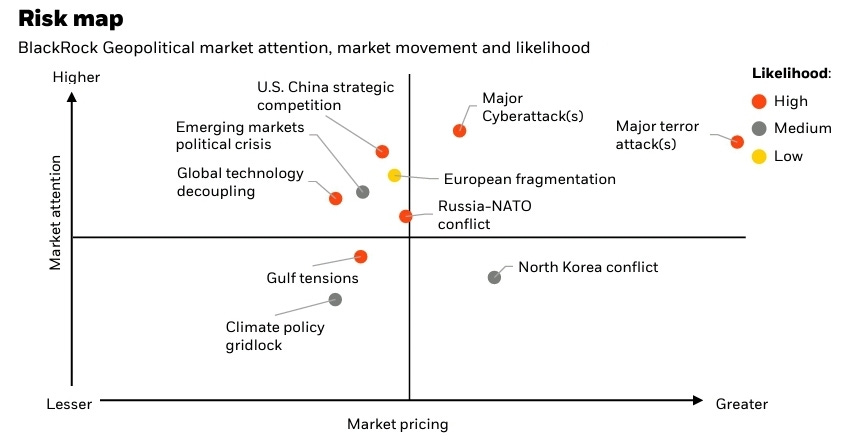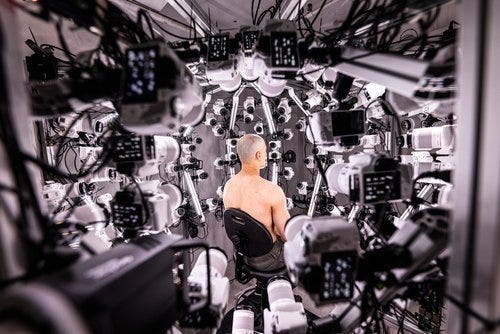The Futures - No. 37
Geopolitical risks a rising C-suite concern / The rise of digital doubles in media / The AI tool that diagnoses autism
In this issue
Hope your 2024 is starting off well! The Quantumrun team shares actionable trend insights about how geopolitical risks are influencing company strategies, digital doubles creating an ethical divide in media, the AI tool that can accurately diagnose autism, and the electronic soil that can increase crop growth.
Future signals to watch
South Korean researchers have developed an AI-based method to diagnose autism spectrum disorder in children with 100% accuracy by analyzing photographs of their retinas. This approach offers a non-invasive and objective screening tool, particularly beneficial in settings with limited access to specialist child psychiatrists.
Wall Street thinks consumers will get used to financial hardships in 2024 after a year of high inflation, mass layoffs, and recession.
Xuzhou Construction Machinery Group has launched the world's first production line for new energy loaders in China, which can reduce 48,400 tons of carbon emissions and 177,500 tons of carbon dioxide annually.
For the first time, a widely used Cessna Caravan cargo plane completed a fully unmanned flight, operated remotely by Reliable Robotics, marking a significant advancement in semi-automated flying systems.
The New York Times is suing OpenAI and Microsoft for using its copyrighted work, a move that breaks the norm for news outlets and aims to address the financial impacts caused by generative AI.
The Philippines started constructing the world’s largest solar farm, covering 3,500 hectares of land and capable of producing 5 billion kilowatt-hours yearly, far more than the current largest solar farms in China and India.
Swedish researchers developed an electrically conductive cultivation substrate, eSoil, which has been shown to increase barley seedling growth by up to 50% in 15 days through electrical stimulation of roots. eSoil has low energy consumption and no high voltage risk, paving the way for new research in advanced hydroponic cultivation.
Culturally // Trending
YouTube → Kung Fu Panda 4 // X → The pinnacle of reality TV // Reddit → This sci-fi garage // TikTok → Grandpacore // Instagram → Padel is the new luxury amenity // Spotify → “Bellakeo”
💡 Watch Quantumrun’s trend videos on Linkedin & YouTube & Instagram & TikTok
Companies plan for escalating geopolitical risks
According to BlackRock’s geopolitical risk dashboard, a global shift is underway characterized by increasing fragmentation and intensified competition, with less cooperation among major world powers. The formation of competing geopolitical and economic blocs is becoming more pronounced, as evidenced by the closer alignment of the US and its European and Asian allies, contrasting with the enhanced cooperation among China, Russia, Iran, and, to some extent, North Korea. These evolving dynamics are hastening changes in the structure of globalization, presenting both risks and investment opportunities.
The ongoing war between Israel and Hamas, with a high risk of regional escalation, brings instability to the Middle East.
The strained US-China relationship, marked by intense competition in defense and technology, significantly influences global businesses.
The protracted Russia-NATO conflict over Ukraine, with no immediate solution, signals the most severe military tension in Europe since WWII.
Cyber attacks, increasing in frequency and sophistication, pose substantial threats to critical infrastructure globally, emphasizing the vulnerability of both physical and digital systems.
The rise in global terrorism, with Al-Qaeda and ISIS regaining strength and lone actor attacks, heightens security concerns across the Middle East, the US, and Europe.

The increasing likelihood of prolonged military conflicts and strained trade relationships is expected to slow down globalization, potentially leading to economic decoupling and deglobalization. This shift poses challenges for corporations, especially those with complex multinational supply chains reliant on diverse markets.
According to KPMG's 2023 CEO Outlook survey, geopolitical and political uncertainty is now the primary concern for business growth, impacting operations in conflict zones and supply chains. Oxford Economics' Global Risk Survey discovered that approximately 36% of surveyed businesses currently consider geopolitical tensions, including those involving Taiwan, South Korea, and the Russia-NATO conflict, as their primary risks.
Actionable trend insights as companies plan for heightened geopolitical risks
For entrepreneurs
They can create platforms or service agencies that help businesses de-risk and comply with varying technological, financial, and border regulations across countries, including data privacy laws or cybersecurity standards.
For corporate innovators
Larger companies can invest in scenario planning and simulation tools to assess how different conflict scenarios between major powers could impact their operations, supply chains, or market access.
They can explore investing in local manufacturing and resource alternatives to mitigate the risks of global supply chain disruptions. For instance, a company reliant on raw materials from conflict-prone areas could invest in research and development of synthetic or recycled alternatives.
For public sector innovators
Public sector entities can initiate or strengthen international collaborative projects to mitigate the effects of geopolitical tensions, such as a multinational initiative to develop shared frameworks for cyber security in response to the increase in cyber attacks linked to geopolitical conflicts.
Government agencies or international organizations can utilize advanced AI-driven analytics to assess the impact of current and future geopolitical tensions on global humanitarian needs. For example, they could use AI to analyze how escalating conflicts or trade disputes might affect refugee flows, food security, or international aid requirements.
Trending research reports from the World Wide Web
According to the Pew Research Center, YouTube remains the preferred entertainment platform by American teens.
According to S&P Global, higher-for-longer interest rates are expected to lead to a period of subpar economic growth in 2024 and a slow adjustment back to stability amid persistent inflation.
Wired takes a closer look at how American schools are implementing censorship through web-filtering systems.
Coindesk thinks the crypto market will mature in 2024, with institutional investors showing increased interest in Bitcoin and Ether, viewing them as tangible assets like gold and oil, potentially revitalizing traditional investment portfolios.
🎭 Digital doubles in media is the new battleground of opportunities versus ethics

As generative AI becomes the norm instead of a novelty, several talent agencies and creatives are finding it useful in expanding their clients’ services. CAA (Creative Artists Agency) is leveraging the potential of digital duplicates, or verified deepfakes, by creating and controlling these replicas for their clients, offering them new avenues for work and artistic expression. They use a comprehensive process at the CAA Vault in Los Angeles involving scanning body, movement, face, and voice, all achievable in a single afternoon.
These duplicates, owned by the clients, can be licensed for various projects, including reshoots, or preserved for future use, granting artists complete control over their digital counterparts. This initiative by CAA counters studios’ unauthorized creation of digital clones, a contentious issue in recent industry labor strikes. Additionally, AI startup Metaphysic, in partnership with CAA, offers similar services and has collaborated with celebrities like Tom Hanks and Octavia Spencer, indicating that access to such technology is not exclusive to CAA clients.
Digital doubles remain a thorny issue. While some consented to undergo this procedure, others were not informed or misled regarding the use of their digital avatars. This practice, which has been ongoing for years, is a key issue in the contract negotiations between SAG-AFTRA and Hollywood studios. Background actors, who form a large part of SAG-AFTRA's membership and typically earn up to USD $187 per day, are particularly vulnerable to being replaced by AI. There are instances where these actors are pressured into undergoing full body scans without prior notice. This practice also affects the jobs of related professionals like costumers, makeup artists, and prop masters.
An example of a 3D head/face scanning studio

Actionable trend insights as digital doubles become more commercialized
For entrepreneurs
Entrepreneurs can partner with celebrities to create their digital doubles and use them for exclusive online concerts, conferences, or meet-and-greets.
There will also be opportunities to create digital doubles/avatars for influencers, business professionals, and everyday people with active travel schedules.
For corporate innovators
Companies can create immersive virtual tours using digital doubles of tour guides. These guides can offer personalized, interactive experiences for potential visitors, showcasing hotels, landmarks, or entire cities.
Corporations can create digital doubles of customers to try on clothes, makeup, or accessories virtually. This approach can be extended to home decor and furniture, where customers can use a digital double to interact with the furniture.
For public sector innovators
Governments can utilize digital doubles in the development of advanced disaster response simulations. Agencies can create hyper-realistic training environments for emergency responders by employing digital doubles to simulate various scenarios, such as natural disasters, terrorist attacks, or pandemic outbreaks.
Before constructing a new public park or transit system, a city could use a simulation with digital doubles to analyze its impact on traffic, pedestrian flow, and local businesses, ensuring the most beneficial and efficient design is implemented.
Digital doubles may one day be incorporated into digitized government identification cards as another verification method.
Outside curiosities
Over 95 years since their debut in Walt Disney's "Steamboat Willie," the initial versions of Mickey and Minnie Mouse became public domain. (There’s already a horror movie in the works.)
David Bowie completely understood the future of the Internet.
Pepsi’s branding is pivoting to anti-sugar.
This woman delivered twins from two separate wombs (a 1-in-a-million birth).
This 17-year-old just became a lawyer, the youngest person to pass the California bar exam.
More from Quantumrun
Read more daily trend reporting on Quantumrun.com
Subscribe to the Quantumrun Trends Platform (free for premium newsletter subscribers).
Corporate readers can review our Trend Intelligence Platform
Email us at contact@quantumrun.com with questions or feedback.
Finally, share your thoughts in the Substack comments below. We love hearing from you!
David Tal, Quantumrun President: Interested in collaborating with the Quantumrun Foresight team? Learn more about us here.
See you in The Futures,
Quantumrun




